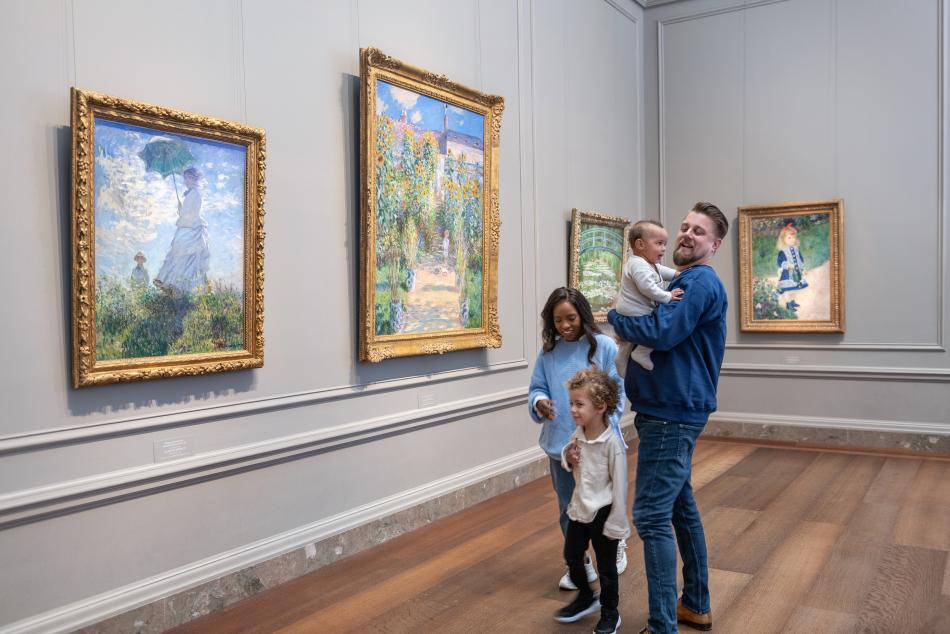Landscape No. 5
1922/1923
Marsden Hartley
Painter, American, 1877 - 1943

Landscape No. 5 is an expressionistic depiction of the American Southwest. It does not represent a specific location, but rather a combination of typical southwestern geographic features. A river runs through a canyon with mountains visible in the background. The scene has been stripped of any identifying details or evidence of human presence. The subdued palette consists of five colors: predominantly black, white, and green, enlivened by red and yellow. The emphasis on geometric forms, two-dimensionality, and the organic, if rather muted, colors recalls the work of Paul Cézanne, an artist that Marsden Hartley greatly admired.
Though the scene has a somewhat bleak air, the artist was quite enthusiastic about his subject. From June 1918 to November 1919 Hartley lived in Taos and Santa Fe, New Mexico, and he was enthralled by the southwestern landscape. He wrote that “any of these beautiful arroyos and canyons is a living example of the splendor of the ages . . . and I am bewitched with their magnificence and their austerity.” He completed a number of pastel and oil sketches of the landscape there, and larger oil paintings after he returned to New York. After relocating to Berlin, in 1923 Hartley commenced working on a group of approximately 35 southwestern landscapes that he described in a letter to his friend and fellow artist Alfred Stieglitz as “New Mexican landscape recollections.” Landscape No. 5 is an early example from this group. Though scholars have attributed Hartley’s desolate depictions of the southwestern landscape to his state of psychological unrest and isolation in Berlin, in his letter to Stieglitz he described them as “a certain coming toward repose” with “no intervention of private states of personal existence.”

East Building Ground Level, Gallery 106-A
Artwork overview
-
Medium
oil on canvas
-
Credit Line
-
Dimensions
overall: 58.4 x 90.2 cm (23 x 35 1/2 in.)
framed: 72 x 104.1 x 3.8 cm (28 3/8 x 41 x 1 1/2 in.) -
Accession Number
1949.2.2
More About this Artwork
Artwork history & notes
Provenance
Alfred Stieglitz [1864-1946], New York; by inheritance to his wife, Georgia O'Keeffe [1887-1986], Abiquiú, New Mexico; gift 1949 to NGA.
Associated Names
Exhibition History
1925
Alfred Stieglitz Presents Seven Americans, The Anderson Galleries, New York, 1925, one of nos. 26-50, as New Mexico.
1997
Loan for display with permanent collection, Baum Gallery of Fine Arts, University of Central Arkansas, Conway, 1997-1998.
2008
Marsden Hartley and the West: The Search for an American Modernism, Georgia O'Keeffe Museum, Santa Fe; Amon Carter Museum, Fort Worth, 2008-2009, unnumbered catalogue, fig. 101.
Bibliography
1970
American Paintings and Sculpture: An Illustrated Catalogue. National Gallery of Art, Washington, 1970: 64, repro.
1980
American Paintings: An Illustrated Catalogue. National Gallery of Art, Washington, 1980: 170, repro.
1981
Williams, William James. A Heritage of American Paintings from the National Gallery of Art. New York, 1981: 216, repro. 226.
1988
Scott, Gail R. Marsden Hartley. New York, 1988: 70-72, pl. 53.
1992
American Paintings: An Illustrated Catalogue. National Gallery of Art, Washington, 1992: 194, repro.
2000
Kirsh, Andrea, and Rustin S. Levenson. Seeing Through Paintings: Physical Examination in Art Historical Studies. Materials and Meaning in the Fine Arts 1. New Haven, 2000: 264.
2007
Hole, Heather. Marsden Hartley and the West: The Search for an American Modernism. Exh. cat. Georgia O'Keeffe Museum, Santa Fe. New Haven and Santa Fe, 2007: 112, fig. 101.
Wikidata ID
Q20192411



